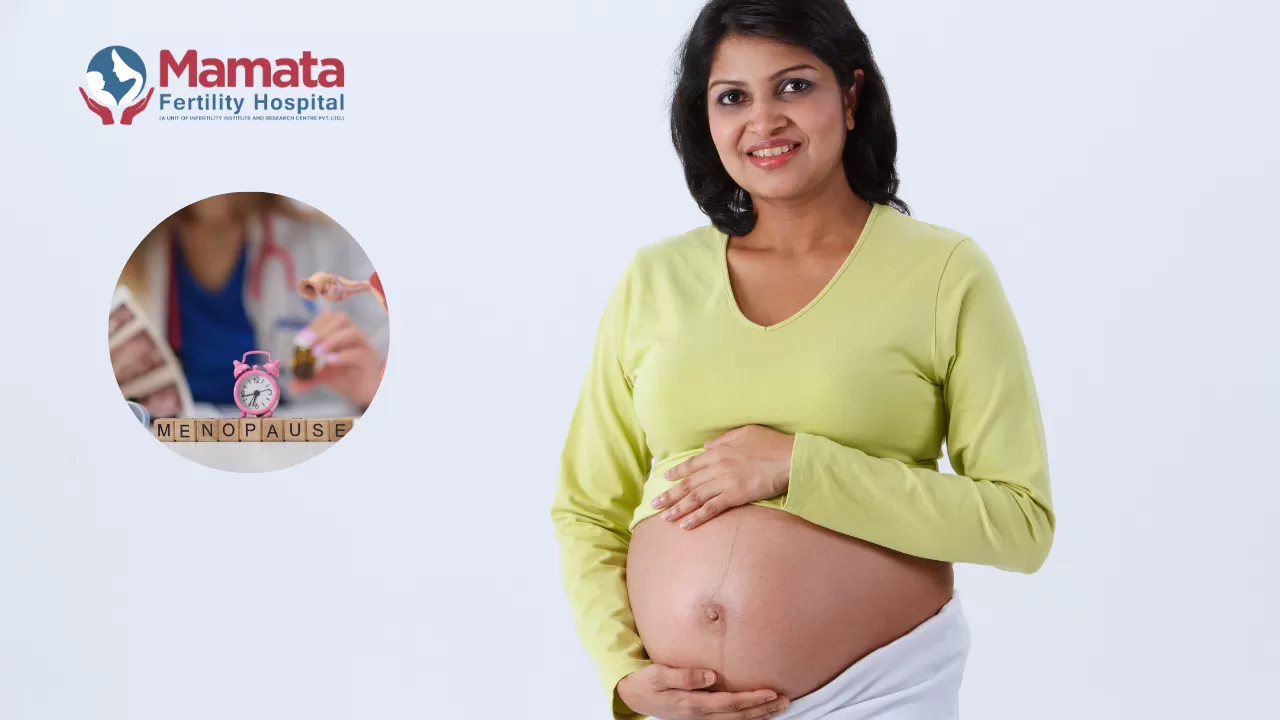Pregnancy After Menopause — Is It Really Possible?
Curious if pregnancy is possible after menopause? The answer is yes—but only with the right medical support and guidance!
In the first sentence alone, we answer the core question, making it clear and accessible. I often hear from patients concerned about “fertility in women” at this later stage, so let me explain everything you need to know with clarity and compassion.

What Is Menopause and Why It Matters?
Menopause is defined as having no menstrual period for 12 consecutive months, usually occurring between the ages of 45 and 55. Perimenopause, the phase leading up to menopause, lasts 3–14 years, during which menstrual cycles become irregular and periods may still occur. During early perimenopause, ovulation can still happen—so natural pregnancy is still possible until menopause is officially reached.
Natural Pregnancy After Menopause: Biological Limits
Once a woman has had 12 months without a period, her ovaries have essentially stopped releasing eggs. At that point, natural conception becomes virtually impossible , While extremely rare spontaneous pregnancies have been recorded in women in their late 50s or even 60s, these are extraordinary exceptions and not the norm.
How Assisted Reproductive Technology (ART) Makes It Possible?
The most reliable path to pregnancy after menopause is IVF (in vitro fertilization) using donor eggs or frozen embryos. Here’s why this works:
- Egg quality matters most: Fertility depends primarily on egg health, not the womb. Donor eggs from younger women reduce age-related risks.
- Uterus still works: With hormonal support to prepare the lining, even a postmenopausal womb can carry a baby .
- Steps involved: Hormone therapy preps the uterus → embryo transfer via IVF → close monitoring by a high-risk OB.
What You Should Know About the Risks?
Pregnancy at an older age—and especially with ART—comes with increased medical challenges for both mother and baby:
Maternal Risks
- Higher chances of high blood pressure, gestational diabetes, placenta previa, and pre‑eclampsia.
- Greater likelihood of cesarean delivery .
Fetal and Newborn Risks
- Increased risk of preterm birth, low birth weight, and chromosomal abnormalities like Down syndrome .
- Higher rates of neonatal complications due to placental issues common in donor egg pregnancies.
I always say to patients: “Your desire to become a parent is valid, but it’s essential we balance hope with careful understanding of risks.” Regular check-ups, ultrasounds, and lab work are vital to keeping both mother and baby safe.
Diagnosing “Where You Are” in Fertility Journey
If you’re unsure whether you’re still in perimenopause or fully menopausal, testing can help:
- FSH, AMH, estradiol levels indicate how well your ovaries are working.
- Pregnancy test (hCG) checks if bleeding is due to a late menstrual period or something else.
- Preconception health checks can assess blood pressure, sugar levels, heart health, thyroid, and lifestyle factors.
This helps me, as your physician, recommend either continued monitoring or fertility treatments based on concrete health data.
Treatment Choices: IVF, Egg Freezing, or Contraception
If You’re Considering Pregnancy
- IVF with donor eggs is the most successful route post-menopause, with success rates between 50–70% per cycle when eggs come from healthy, young donors.
- Frozen eggs you preserved earlier could also be used, offering better genetic matching.
- During treatment, fertility teams at Fertility Hospital Hyderabad provide personalized monitoring to ensure optimal results.
If You’re Not Planning Pregnancy
- During perimenopause, continue contraception until you’ve had no periods for a full year to avoid unintended pregnancy.
Prevention & Long-Term Tips
- Egg freezing: sometimes in your 30s or early 40s, preserves fertility options before egg quality naturally declines .
- Lifestyle supports fertility: balanced nutrition, regular exercise, calcium/vitamin D for bone health, and mental wellness.
- Emotional support is crucial: Work with counselors or peer groups to navigate hopes, disappointments, and expectations.
Ethical & Emotional Considerations
These decisions can carry emotional weight—whether about parental age, future caregiving, or long-term planning:
- Ethically, we must weigh parental desire against long-term welfare of the child journalofethics.ama-assn.org.
- Emotionally, grief over lost fertility and regret from previous choices (like delaying fertility tests) are common. I always encourage patients to process these emotions with professionals so they are ready for whatever decision they make.
Conclusion:
Yes, pregnancy after menopause is medically possible—but not naturally. With fertility treatments like donor-egg IVF, supported by expert care, many women succeed in having healthy pregnancies.
At Mamata Fertility Hospital Hyderabad, our goal is to help women understand their options, risks, and hope. Whether you choose fertility treatments or look toward other paths to parenthood, I’m here to walk with you every step of the way.

Dr Aarti Deenadayal Tolani
MBBS, MS ( OBGYN), FICOG
Clinical Director, Scientific In- Charge & Fertility Consultant with 15+ years Of Experience
CONSULT FERTILITY SPECIALIST

Latest BLOGS

How does preeclampsia affect the baby?
Learn how preeclampsia affect the baby growth, birth outcomes, and long-term health from Mamata Fertility Hospital Hyderabad.

Is it safe to get pregnant after preeclampsia?
Planning pregnancy after preeclampsia? Learn risks, safety tips, and care strategies from Mamata Fertility Hospital Hyderabad.

Can AI Predict Pregnancy Risk?
Discover how AI predict pregnancy risks, improves maternal care, and shapes safer pregnancies. Learn more from Mamata Fertility Hospital Hyderabad.

Miscarriage Risk by Week and Age
Learn miscarriage risk by week and age, causes, signs, and prevention tips. Get expert care from Mamata Fertility Hospital Hyderabad.

